Bill Barr has resigned. But did he jump or was he pushed?
The controversial Trump-enabling Attorney General resigned unexpectedly, releasing a public letter to the president as he did so

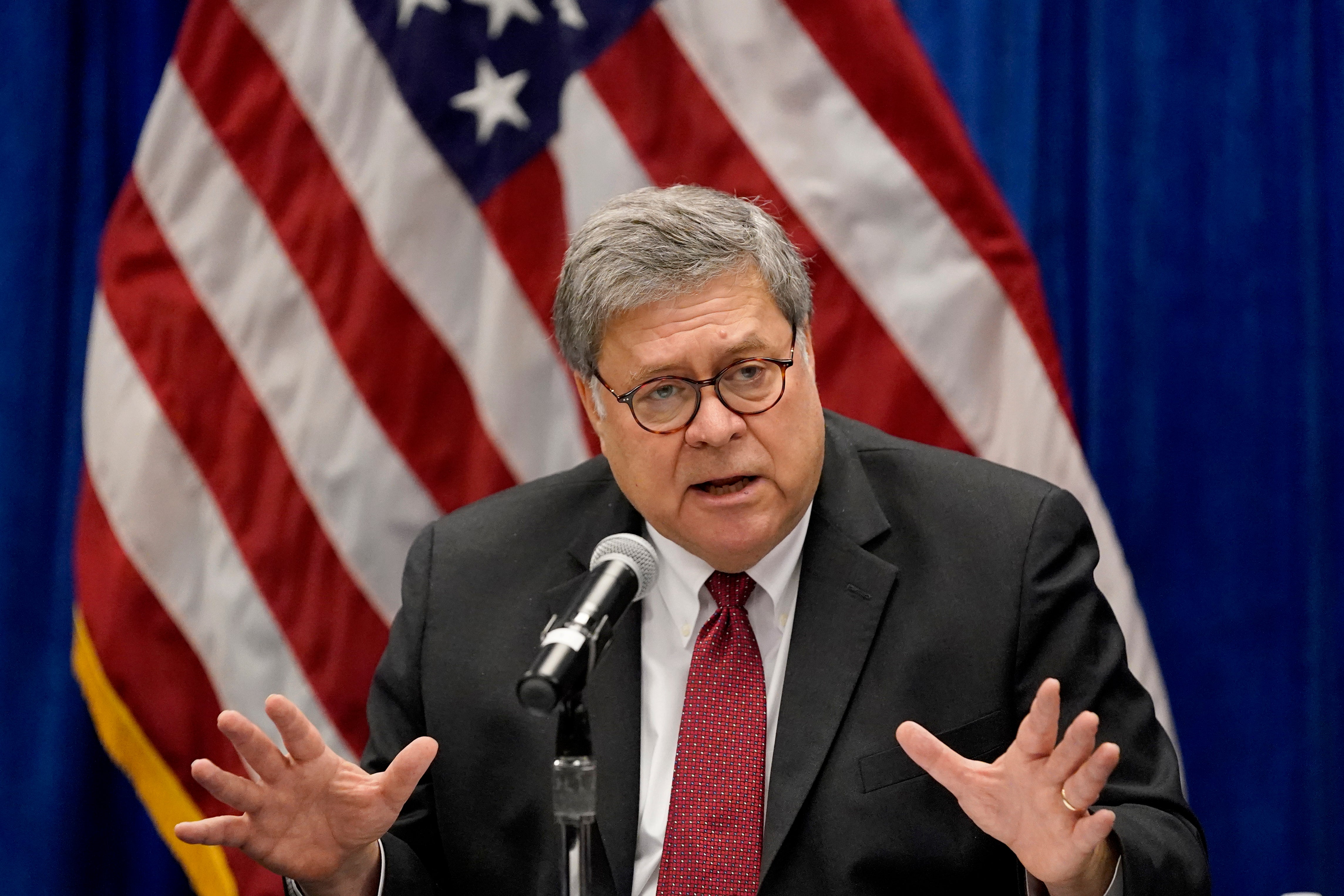
Your support helps us to tell the story
From reproductive rights to climate change to Big Tech, The Independent is on the ground when the story is developing. Whether it's investigating the financials of Elon Musk's pro-Trump PAC or producing our latest documentary, 'The A Word', which shines a light on the American women fighting for reproductive rights, we know how important it is to parse out the facts from the messaging.
At such a critical moment in US history, we need reporters on the ground. Your donation allows us to keep sending journalists to speak to both sides of the story.
The Independent is trusted by Americans across the entire political spectrum. And unlike many other quality news outlets, we choose not to lock Americans out of our reporting and analysis with paywalls. We believe quality journalism should be available to everyone, paid for by those who can afford it.
Your support makes all the difference.Just moments after California's 55 electoral votes officially made Joe Biden the President-elect of the United States, the man he will replace in 37 days reacted the same way he did after voters dealt him a severe rebuke at the ballot box two years ago: he forced out an Attorney General who'd refused to violate longstanding Department of Justice policies for his political benefit.
"Just had a very nice meeting with Attorney General Bill Barr at the White House. Our relationship has been a very good one, he has done an outstanding job!" Trump tweeted, adding that Barr would be leaving just before Christmas to "spend the holidays with his family" (a familiar Washington bromide long used to paper over the reason for many a resignation).
An accompanying resignation letter revealed that Barr had spent part of the meeting endeavouring "to update [Trump] on the Department's review of voter fraud allegations in the 2020 election and how these allegations will continue to be pursued" (Barr recently told the Associated Press that no fraud has been found) and noted that he was "greatly honored" to have had an opportunity to serve once again as Attorney General, a position he previously held during the second half of the George HW Bush administration. After devoting several paragraphs to praising the president, Barr closed the missive by noting that his second stint as the nation's top law enforcement officer will come to an end on December 23.
While multiple news outlets had in recent days reported that Barr had planned to stay on through the end of Trump's term in the same manner he had done with the elder President Bush, he, like his predecessor Jeff Sessions, had lost Trump's confidence because of a refusal to cross an ethical line.
Sessions had spent nearly all of his two-year tenure at the helm of the Justice Department as a hate object for the president and his supporters thanks to his decision to follow the counsel of career ethics experts who advised him that as a former adviser to Trump's 2016 effort, he was required to recuse himself from any matter which might involve the president's campaign.
But what line was it that pushed Trump's patience with one of his most trusted advisers and loyal soldiers beyond its breaking point?
The same line that former FBI Director James Comey may have gotten Trump elected by crossing just over four years ago.
It was Comey who upended the 2016 race on October 28 of that year by revealing, in a letter to Congress, that the Bureau had reopened the long-running investigation into former Secretary of State Hillary Clinton's use of a private email server after finding a cache of emails on a laptop belonging to the husband of a Clinton adviser in the course of an unrelated probe. A second letter, sent three days before the November 9 election, alerted Congress that FBI would not be changing its recommendation that Clinton not be charged with any crimes, but after nine days of non-stop media coverage of the first letter, the damage was done.
Six months later, in a memo to Sessions, then-Deputy Attorney General Rod Rosenstein noted that numerous former Attorneys General and Deputy Attorneys General had strongly decried Comey's pre-election actions broke with longstanding rules requiring the department to refrain from any announcements or overt actions which could impact an election within 60 to 90 days of Election Day. It was that breach of protocol (and others) that formed the backbone of Rosenstein's (largely pretextual, as it turned out) recommendation that Trump fire Comey.
During his tenure, Barr has been a willing lightning rod for criticism by legal experts and former DOJ officials who've slammed what they say has been a willingness on his part to politicize the Justice Department to serve Trump's goals, including issuing a statement about former Special Counsel Robert Mueller's report on the investigation into ties between Russia and the 2016 Trump campaign that largely downplayed its findings, overriding career prosecutors' sentencing recommendations for Trump confidante Roger Stone, and pushing to drop charges against former Trump National Security Adviser Michael Flynn.
Yet in the end, there was one line Barr would not cross: he would not put his thumb on the scales by publicly revealing that his department has been investigating whether Biden's son, Hunter Biden, has violated any federal tax laws.
According to The Wall Street Journal, an investigation into the younger Biden's taxes had been underway for some time, but Barr had laboured to keep it under wraps in compliance with that longstanding policy.
During a Saturday interview with Fox News, Trump said that he was "disappointed" in Barr's decision, and lamented that the soon-to-be former AG "should have stepped up".
But Trump, who has boasted of not needing to read, might have seen Barr's adherence to tradition coming had he done a bit of research on him.
In 1992, as the elder President Bush was locked in a fierce re-election battle against then-Arkansas Governor Bill Clinton, whose involvement in a failed Arkansas land deal was coming under FBI investigation.
When FBI officials appeared to pressure then-Arkansas US Attorney Charles Banks into taking steps (such as issuing subpoenas) that would have become public before Election Day, Banks pushed back, writing: "Neither I personally nor this office will participate in any phase of such an investigation ... prior to November 3, 1992."
"For me personally to participate in an investigation that I know will or could easily lead to the above scenario and to the possible denial of rights due to the targets, subjects, witnesses or defendants is inappropriate. I believe it amounts to prosecutorial misconduct and violates the most basic fundamental rule of Department of Justice policy," he wrote.
The investigation did not become public knowledge until after Clinton had defeated Bush (who remained the most recent one-term president until Biden's victory over Trump), but three years later when irate Republicans on a Senate committee looking into the deal asked Barr about Banks' decision (which they implied may have cost Bush the election) Barr said he knew of "know basis for questioning" it.
"There are cases where the role of the sensitive figure is such that you wouldn't think that they would really be ultimately tied up in a thing as subjects or targets, and you would want to assure that the case does not play a role in the election process by assuring that there are no public steps taken," Barr said during a 1995 deposition under oath. "Based on what I knew ... this would fall in that category."
When the same situation presented itself a quarter-century later, Barr did the same thing.
In his resignation letter, Barr said "it is incumbent on all levels of government ... to do all we can to assure the integrity of elections and promote public confidence in their outcome."
It may have cost him 37 more days on the job, but by remaining consistent in following this one area of Justice Department policy, Barr may have done exactly that.
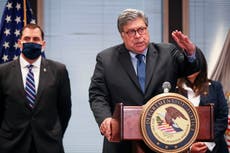
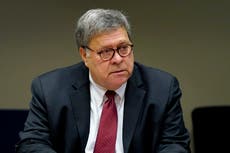
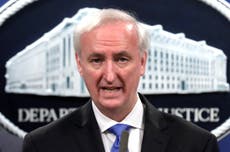
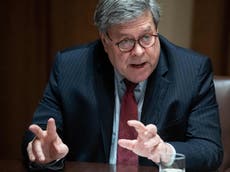
Join our commenting forum
Join thought-provoking conversations, follow other Independent readers and see their replies
Comments